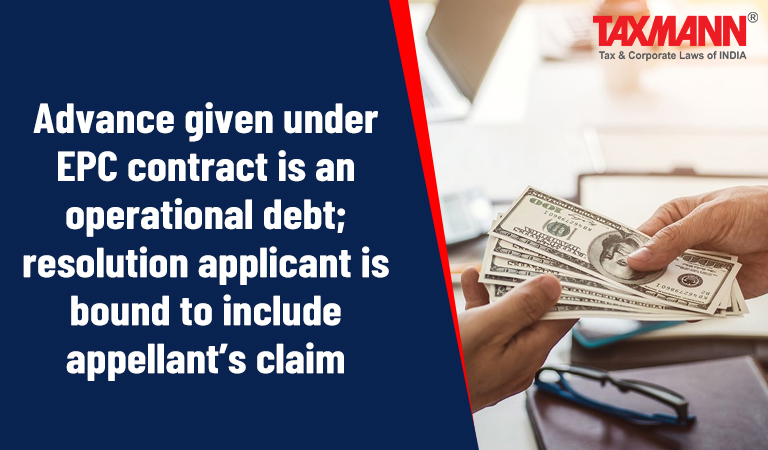Advance given under EPC contract is an operational debt; resolution applicant is bound to include appellant’s claim
- Blog|News|Insolvency and Bankruptcy Code|
- 2 Min Read
- By Taxmann
- |
- Last Updated on 1 November, 2022

Case Details: Athena Demwe Power Ltd. v. Abir Infrastructure (P.) Ltd. - [2022] 143 taxmann.com 274 (NCLAT-New Delhi)
Judiciary and Counsel Details
-
- Justice Ashok Bhushan, Chairperson, M. Satyanarayana Murthy, Judicial Member
& Barun Mitra, Technical Member - Kunal Godhwani, Adv. for the Appellant.
- P. Ramesh Babu, Adv., Ramji Srinivasan, Sr. Adv. & R.S. Sravankumar, Adv. for the Respondent.
- Justice Ashok Bhushan, Chairperson, M. Satyanarayana Murthy, Judicial Member
Facts of the Case
In the instant case, the appellant awarded a contract to the corporate debtor and advanced an amount as a mobilization advance. Meanwhile, an order was passed by the Adjudicating Authority (NCLT) initiating the CIRP against the corporate debtor and the appellant filed its claim to RP as a financial creditor.
The RP informed the appellant that its claim couldn’t be considered as operational creditor or financial creditor, however would be considered in the capacity of other creditor. Thereafter, the appellant filed its claim as other creditor reserving its right to approach the NCLT.
However, RP informed the appellant that its claim would be considered in the capacity of other creditor only when the appellant accepted that it was neither the financial creditor nor the operational creditor. The appellant filed an application before the NCLT challenging rejection of its claim.
Subsequently, the CoC approved the resolution plan, and RP filed an application for approval of the resolution plan. However, the NCLT by the impugned order approved the resolution plan and dismissed the application filed by the appellant.
Thereafter, an appeal was made to the National Company Law Appellate Tribunal (NCLAT) against the order passed by the NCLT. The appellant contended that the mobilization advance given to the corporate debtor was financial debt.
The NCLAT observed that the mobilization advance given by the appellant to the corporate debtor did not fall in any of clauses (a) to (h) of section 5(8) of the IBC and, hence, the appellant couldn’t avail any benefit of provisions of section 5(8)(i).
NCLAT Held
The NCLAT held that the mobilization advance given by the appellant to the corporate debtor was in pursuance of an EPC contract agreement between parties, and the amount of mobilization advance given by the appellant to the corporate debtor was an operational debt.
Further, the NCLAT held that the resolution applicant was under obligation to include a claim of the appellant as an operational debt and make payment to the appellant as an operational creditor. Accordingly, the appeal was allowed.
List of Cases Reviewed
-
- Order of NCLT (New Delhi) in I.A. No. 3197/ND/2020, dated 12-1-2022 (para 12) reversed
- Consolidated Construction Consortium Ltd. v. Hitro Energy Solutions (P.) Ltd. [2022] 135 taxmann.com 97/171 SCL 56 (SC) (para 12) followed.
List of Cases Referred to
-
- IDBI Trusteeship Services Ltd. v. Abhinav Mukherji [Company Appeal (AT) (Insolvency) No. 356 of 2022, dated 12-7-2022] (para 9)
- Consolidated Construction Consortium Ltd. v. Hitro Energy Solutions (P.) Ltd. [2022] 135 taxmann.com 97/171 SCL 56 (SC) (para 11).
Disclaimer: The content/information published on the website is only for general information of the user and shall not be construed as legal advice. While the Taxmann has exercised reasonable efforts to ensure the veracity of information/content published, Taxmann shall be under no liability in any manner whatsoever for incorrect information, if any.

Taxmann Publications has a dedicated in-house Research & Editorial Team. This team consists of a team of Chartered Accountants, Company Secretaries, and Lawyers. This team works under the guidance and supervision of editor-in-chief Mr Rakesh Bhargava.
The Research and Editorial Team is responsible for developing reliable and accurate content for the readers. The team follows the six-sigma approach to achieve the benchmark of zero error in its publications and research platforms. The team ensures that the following publication guidelines are thoroughly followed while developing the content:
- The statutory material is obtained only from the authorized and reliable sources
- All the latest developments in the judicial and legislative fields are covered
- Prepare the analytical write-ups on current, controversial, and important issues to help the readers to understand the concept and its implications
- Every content published by Taxmann is complete, accurate and lucid
- All evidence-based statements are supported with proper reference to Section, Circular No., Notification No. or citations
- The golden rules of grammar, style and consistency are thoroughly followed
- Font and size that’s easy to read and remain consistent across all imprint and digital publications are applied



 CA | CS | CMA
CA | CS | CMA
